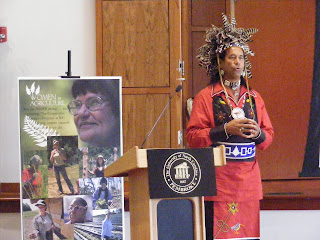If you are happy about the recent decline in the bee population, think again. The chances of getting stung by a bee this summer may have decreased. However, honeybees are dying at alarming levels. So you may be asking, “Why should America care, we have enough insects?”
According to the “Crop-helping honeybees dying mystery deaths” posted by Patrick Cooper, "While a few crops, such as corn and wheat, are pollinated by the wind, most need bees. Without these insects, crop yields would fall dramatically. Agronomists estimate Americans owe one in three bites of food to bees." Honeybees are responsible for pollinating more than $15 billion worth of U.S. crops, including Pennsylvania's apple harvest, the fourth-largest in the nation, worth $45 million, and New Jersey's cranberries and blueberries. Several states are investigating the "Colony Collapse Disorder".
Still wondering why you have not heard or read a lot about the disappearance of the honeybee, your answer is here. "More than half the honey sold in the United States is imported, especially from Argentina and China." I am sure you have heard a lot recently about America’s dependence on other countries for oil but how about insects to help produce the natural resource “food”.
Honey bees are native to Europe and Asia. These social insects were first brought to the Americas in the 1600s. Their colony has one queen, 20,000 to 80,000 female workers, and up to 5,000 male drones. The primary responsibility of the queen is reproduction. Her eggs will develop into workers, drones, or new queens depending on the time of year and the colony’s strength. Workers have various responsibilities at different stages in their life cycle which include brood rearing, comb building, queen care, foraging, nest construction, nest maintenance, honey production, honey storage, colony defense, and hive thermoregulation. Drones are only needed for reproduction and die immediately after successfully copulating. Female worker bees chew of the wings of those that fail to mate and thrown them out of the nest in the fall. Their population is lowest during winter and peaks during late spring or early summer.
Bees are a natural resource needed to continue producing high yield crops. Their pollination of agricultural crops is valued between $8 and 10 billion per year and is 30 to 40 times greater than the value of honey and beeswax alone. “Approximately 30% to 35% of food in the United States is directly or indirectly dependent on insect pollination.” Cucumbers, strawberries, squash, beans, pumpkins, watermelons, muskmelons, blueberries, peas, and peppers all require bee pollination to produce larger, more attractive fruit and vegetables. Good pollination also results in a higher crop yield where development is more synchronized. Conversely, bad pollination leads to smaller yields of inferior fruit over an extended period. “Annually, about 2 million colonies are contracted out for pollination in the United States”.
What can you do to help insure high crop yields? How about placing a bee apiary on your property? I recently attend the National Youth in Today’s Agriculture (N-YITA) Youth Assembly and Agricultural Mission, Inc., “Food Sovereignty” Study Session in Shawnee, OK. Youth are concerned about today’s agriculture. Our voices echoed “Every American should become more proactive in protecting our natural resources especially our crops.” We all need to eat. So, please join me, N-YITA, the Rural Coalition and other protectors of our natural resources to prevent the “Silence of the Bees”!
Tequorra is a student in OK and is interested in assisting with outreach and volunteering to assist the Rural Coalition with its goals in Oklahoma and among Native Americans. She has served as a National Representative on the Talented American Indian Leaders' Student (TAILS) UNITY Council - 2008-Present and an Area Representative on the NC Native American Youth Organization - 2004 - 2009. Both youth councils are affiliated with UNITY Inc. She has presented at the UNITY National conference in the past and would like to present a workshop in the future to bring attention and inform Native Americans about the Rural Coalition and its mission/goals















